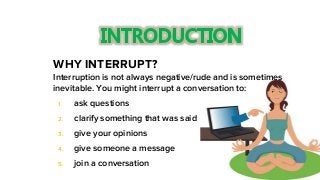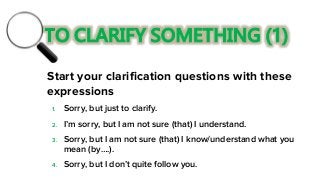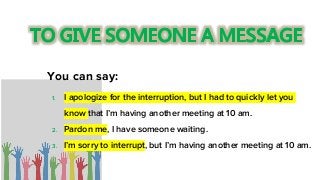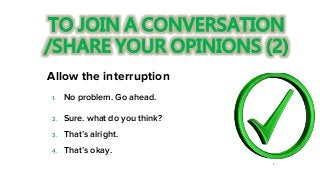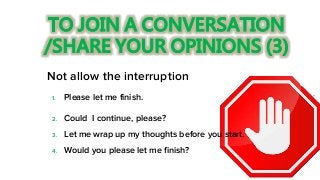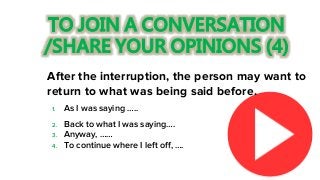How to Interrupt Someone Politely in English
- 1. Is It Rude to Interrupt Someone Who Is Speaking?
- 2. BUSINESS ENGLISH-PART 4 HOW TO INTERRUPT POLITELY IN MEETINGS
- 3. WHY INTERRUPT? Interruption is not always negative/rude and is sometimes inevitable. You might interrupt a conversation to: 1. ask questions 2. clarify something that was said 3. give your opinions 4. give someone a message 5. join a conversation
- 4. 1. Ask for permission to jump in 2. Apologize for the interruption 3. Chime in the relevant points
- 5. Start your clarification questions with these expressions 1. Sorry, but just to clarify. 2. IŌĆÖm sorry, but I am not sure (that) I understand. 3. Sorry, but I am not sure (that) I know/understand what you mean (byŌĆ”.). 4. Sorry, but I donŌĆÖt quite follow you.
- 6. Then followed by clarification questions: 1. Could you say it in another way? 2. Could you clarify that for me? 3. Could you elaborate on that? 4. Could you give me an example? 5. Could you be more specific? 6. What you sayŌĆ”.., do you meanŌĆ”..?
- 7. Examples: 1. IŌĆÖm sorry but IŌĆÖm not sure I understand. When you say she has an appointment tomorrow, do you mean she wonŌĆÖt join the meeting with us? 2. Sorry but I donŌĆÖt quite follow what youŌĆÖre saying about the new policy. Could you be more specific about gift card restrictions?
- 8. After the person clarifies themselves, you may offer thanks to them: 1. I got it. Thank you. 2. Ah I see. Thanks for clarifying. 3. Now I understand. Thanks a lot.
- 9. You can say: 1. I apologize for the interruption, but I had to quickly let you know that IŌĆÖm having another meeting at 10 am. 2. Pardon me, I have someone waiting. 3. IŌĆÖm sorry to interrupt, but IŌĆÖm having another meeting at 10 am.
- 10. You can say: 1. Could I jump in? 2. Could I add something? 3. Do you mind if I say something? 4. May I interject? 5. Would you mind if I joined? 6. Could I have a question? 7. Sorry to butt in, but I thinkŌĆ”
- 11. Allow the interruption 1. No problem. Go ahead. 2. Sure. what do you think? 3. ThatŌĆÖs alright. 4. ThatŌĆÖs okay.
- 12. Not allow the interruption 1. Please let me finish. 2. Could I continue, please? 3. Let me wrap up my thoughts before you start. 4. Would you please let me finish?
- 13. After the interruption, the person may want to return to what was being said before. 1. As I was saying ŌĆ”.. 2. Back to what I was sayingŌĆ”. 3. Anyway, ŌĆ”ŌĆ” 4. To continue where I left off, ŌĆ”.
- 14. Practice what you learned today. Write your response in the comment below. You are at a school, and you want to register for an English course. The school representative is describing the different types of courses. You are not sure you understand his explanation of the course design. Express your lack of understanding and ask for clarification.
Editor's Notes
- #2: Is it rude to interrupt someone who is speaking in the meeting? It is not comfortable to do, but sometimes itŌĆÖs necessary. How to do that politely to let the person know your good intention of interrupting? This video has answer for you.
- #3: HELLO THERE! AS PROMISED, TODAY IŌĆÖM GONNA SHARE WITH YOU ANOTHER LESSON RELATED TO WORKPLACE MEETINGS. IN MY PREVIOUS VIDEO, I ALREADY TALKED ABOUT HOW TO CONDUCT A MEETING IN ENGLISH. IF YOUŌĆÖD LIKE TO WATCH IT, YOU CAN EITHE CLICK THE LINK ABOVE OR IN THE DESCRIPTION BELOW. IN THIS VIDEO, YOU WILL LEARN HOW TO INTERRUPT SOMEONE WITHOUT BEING COME ACROSS AS BEING RUDE.
- #4: To run a smooth and effective meeting, you need to follow these 2 steps: self introduction and setting the agenda In this lesson, IŌĆÖm gonna share with you expressions to introduce yourself, ask other members to introduce themselves, and set the meeting agenda. Now letŌĆÖs begin!
- #5: SOME PEOPLE ARE AFRAID OF INTERRUPTING WHEN SOMEONE IS SPEAKING IN THE MEETING THOUGH ITŌĆÖS RIGHT TO DO BECAUSE THEY ARE SCARED OF COMING ACROSS AS BEING RUDE OR UPSETTING THE SPEAKER. READ THE SLIDE KNOWING HOW TO SAY THAT PROPERLY, YOU WILL BE APPRECIATED FOR YOUR INTERRUPTION AS IT SHOWS THAT YOU PAY ATTENTION TO AND SHOW YOUR INTEREST IN WHAT IS BEING PRESENTED. IN THIS LESSON, YOU WILL LEARN ESSENTIAL EXPRESSIONS FOR THESE 4 SITUATIONS. Please keep in mind that polite interruption should always be accompanied by either an apology or permission seeking questions.
- #6: SOME PEOPLE ARE AFRAID OF INTERRUPTING WHEN SOMEONE IS SPEAKING IN THE MEETING THOUGH ITŌĆÖS RIGHT TO DO BECAUSE THEY ARE SCARED OF COMING ACROSS AS BEING RUDE OR UPSETTING THE SPEAKER. READ THE SLIDE KNOWING HOW TO SAY THAT PROPERLY, YOU WILL BE APPRECIATED FOR YOUR INTERRUPTION AS IT SHOWS THAT YOU PAY ATTENTION TO AND SHOW YOUR INTEREST IN WHAT IS BEING PRESENTED. IN THIS LESSON, YOU WILL LEARN ESSENTIAL EXPRESSIONS FOR THESE 4 SITUATIONS. Please keep in mind that polite interruption should always be accompanied by either an apology or permission seeking questions.
- #11: Then, you can introduce yourself; 1. Expression 2 is when youŌĆÖd like to state a reason of your meeting.
- #12: Then, you can introduce yourself; 1. Expression 2 is when youŌĆÖd like to state a reason of your meeting.
- #13: Then, you can introduce yourself; 1. Expression 2 is when youŌĆÖd like to state a reason of your meeting.
- #14: Then, you can introduce yourself; 1. Expression 2 is when youŌĆÖd like to state a reason of your meeting.
- #15: Then, you can introduce yourself; 1. Expression 2 is when youŌĆÖd like to state a reason of your meeting.
- #17: Then, you can introduce yourself; 1. Expression 2 is when youŌĆÖd like to state a reason of your meeting.



